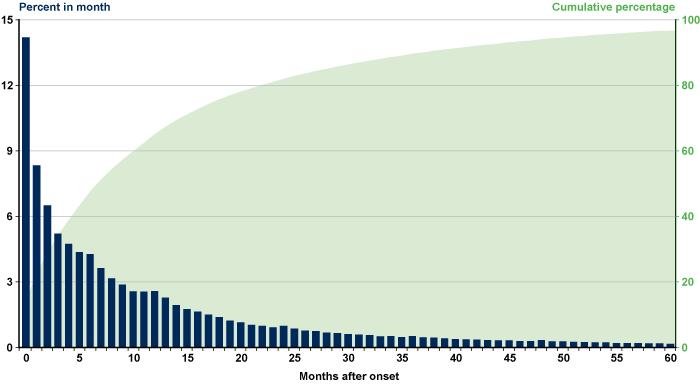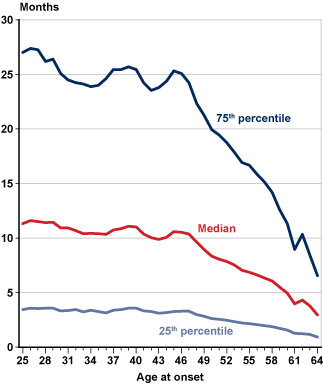The Social Security Bulletin has an interesting article titled The Time Between Disability Onset and Application for Benefits: How Variation Among Disabled Workers May Inform Early Intervention Policies. Obviously, the article is concerned with how this gap time affects rehabilitation. I don't think the length of the gap time will matter much as far as rehabilitation is concerned are since I think that there are few applicants for Social Security disability benefits who can realistically be rehabilitated. Rehabilitation is a mirage based upon the misconceptions that Social Security disability claimants aren't all that sick or that they many suffer from problems that one can find a way around.
The article does give some historic numbers on a topic of interest to me, at least, which is how long people wait after becoming disabled before they file disability claims with Social Security. I've wondered whether factors such as difficulty in contacting Social Security to file a claim and public perceptions about how easy or difficult it is to be approved for Social Security disability benefits affect how long people wait to file claims. Changes in the lag time between onset of disability and claim filing could affect the rate at which claims are filed. Unfortunately, the article doesn't give information to show how the lag time has changed over time but it does give some historic numbers. During the time period 2013-2014 the median gap time was 7.6 months. Don't ask me why they didn't use a more recent time period. Below is a chart from the article:
 |
| Click on image to view full size |
I would have been very interested to see whether this gap time was stable over time. What was it in 2010 compared to 2019? Unfortunately, the authors do not present such data.
However, the authors do present data showing that the younger that disabled people are, the longer they wait to file disability claims:
 |
| Click on image to view full size |
8 comments:
It seemed unclear whether the study only looked at Title II disability benefit claims, which permit recovery of 12 months of retroactive benefits, as opposed to SSI benefits where one can only collect starting the month after date of filing. It would be interesting to see the difference in the data between the two programs.
It's no surprise that it could take a person at least several months to determine if their conditions will likely meet the 12 month duration requirements, and whether it will preclude them from performing substantial gainful activity in other jobs whose requirements they are not familiar with. Even vocational experts struggle with such questions, so an unaided layperson without knowledge of the requirements of unfamiliar jobs would certainly have difficulties. Add to that the fact that a person can only speculate how their impairments will react to any new attempted job activities, before actually trying them. The forced choice between unemployment and disability benefits in some jurisdictions overlooks those realities. Many who are in fact disabled, will try to find work they can sustain and likely only apply for disability after it becomes clear they cannot find or keep a job.
I was expecting a sky is falling post about how the proposed payroll tax holiday being proposed will hurt the trust fund, but got this softball instead.
Good article.
Most conservatives will tell you most disabled workers are just looking to go onto disability. Most are not. And most hope they will eventually go back to work. Feel like this is the biggest reason claimants wait.
For SSD, waiting 7.6 months will not result in lost back due benefits. However, it does delay the process to go on disability. But those only filing for SSI lose benes if they wait.
I tell my clients that if they have the inclination they will be out of work for 12 consecutive months then file the application. It does not hurt and you can always withdraw the application. Never hurts.
@8:58
Good point. An interesting experiment would be to run a pilot allowing SSI applicants to get 12 months of retroactive benefits from the date of filing. Would that cut down on the number of SSI applications filed if claimants felt they could do so without risking months of SSI benefits and potential Medicaid coverage to wait and see if their condition improved within 12 months? Or to have a reasonable amount of time to test their ability to sustain employment in different jobs (or even get vocational rehabilitation advice) following an injury or onset of illness? Under the current rules, it pays SSI claimants to, as you indicate, rush to file even before it may be clear how long their disabling condition might last, or whether they can reasonably ascertain whether they could do other work, or in many cases, generate the documentation required by a listing.
@ 7:19 - so increase the payments to see if less people apply? I dont think that's how that would work out. Plus, in all seriousness, I dont think most people know about the difference between ssi and ssd in terms of back pay. I dont think it would make a difference in how many people apply or when.
@4:43
You may be right, but it would be interesting to see.
One thing I had not considered is the role of Obamacare (Affordable Care Act) in delaying some disability claim receipts. In no few cases, the immediate impetus to file for SSI/SSD disability is loss of medical coverage. If you are very ill, lost your job, and you lost the medical coverage needed to treat your illness then you are going to immediately look for any way to get medical coverage. Yes, you can pay to extend employer based health benefits after you lose your job, but that is prohibitively expensive for a person who just lost their job income.
Before Obamacare, in many states, your only option was to get Medicaid through SSI or, after a 2 year wait, Medicare through SSDI. That's a strong incentive to immediately file for disability or you are going to quickly go bankrupt from medical debt. However, post-ACA, at least in states with Obamacare, many would at least have Medicaid coverage as a safety net regardless of whether they filed for SSI. You still have incentive to file because of loss of income, but less incentive, because you have not lost all medical coverage to treat your serious illness.
@7:19
The individuals who could wait 12 months after onset to file a claim for SSI would most likely not be in need of SSI because they had sufficient income or resources that could tide them over. Which probably also means that they didn't meed the income and resource rules of SSI. SSI is needs based disability so the application date is as soon as the person feels needy enough to contact SSA.
What is their definition of "onset?" When the first symptoms occur, when diagnosed or when the claimant can no longer "work." Even the definition of "work" is subjective. Of course, I used subjective on perpose, because pain is supposedly subjective. Let's end this screwed up system and bring in potential employers and let them decide if they think the person could be employed.
Post a Comment